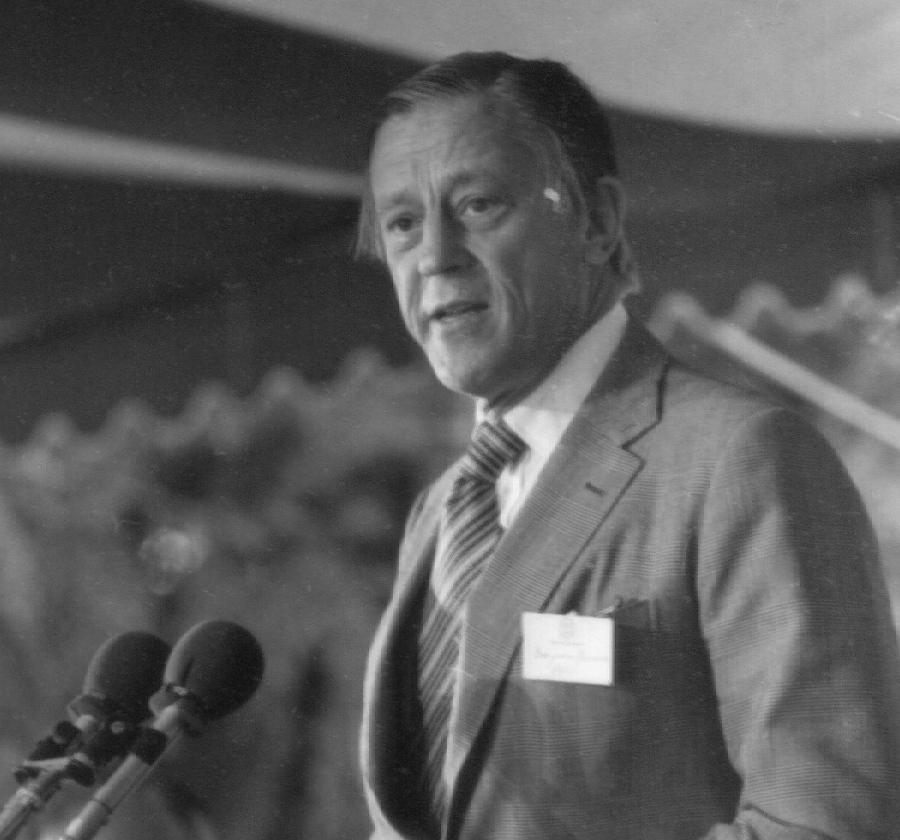Benjamin C. Bradlee, the legendary Washington Post editor who died October 21, was known for his eloquence, sharp wit, and speaking truth to power. These qualities are evident in the following stories from Nieman Reports.
Bradlee was among the illustrious guests at the dedication of the Nieman Foundation’s home, the Walter Lippmann house, in 1979. He was a personal friend of the Lippmanns, and Walter Lippmann, the famed columnist and a founding editor of The New Republic, taught Bradlee a few important lessons as a young man. First, it was that “there is no single truth out there for you journalists to write,” Bradlee said in his speech.
Perhaps even more influentially, Lippmann was the man who encouraged Bradlee to use his full name in his byline. When Bradlee started at The Washington Post, he used “Ben Bradlee,” but soon after his arrival Lippmann pulled him aside. “You’ve got to change that by-line,” Lippmann told the young Bradlee. “‘Ben Bradlee’ is perfectly fine for New Hampshire [where he had been] but in Washington, that’s a sportswriter’s by-line, and it just won’t do.” And Bradlee promptly changed it.
Among the many journalists who worked with Bradlee he was known for his larger-than-life personality. In an article in the Fall 1991 issue of Nieman Reports about covering corporate misconduct, Washington Post reporter Morton Mintz, a 1964 Nieman Fellow, writes of Bradlee’s response to his complaints about over-editing. Mintz, perhaps best-known for breaking the story about the birth defects associated with thalidomide, complained that his editors had subjected him to “morale-crushing discouragement and nibblings to death" and "abusive extremes." Bradlee had little sympathy, telling Mintz that all he had undergone was likely what "the editors of this newspaper, honestly and with principle, call editing."
Bradlee brought this same sensibility to his understanding of journalism’s role in society. In Prague, at a 1990 conference on building a free press in post-Communist Europe which was featured in a Nieman Reports special issue, Bradlee sketched out his thoughts on how to run a good newspaper, and government relations were a major point in his speech. But first he said : “I would worry about owners. Good editors are made in the first instance by good owners. Said another way, an editor can be no better than an owner wants him to be.”
He followed with advice about finding good reporters and, even more significantly, he advised the newly free press of this region to be watchful of the similarly new and free governments under which they presided. Bradlee at this point mentioned the Pentagon Papers and the light they shed on the Vietnam War—for example, Defense Secretary Robert McNamara was, in 1963, not at all pleased with the progress of the war, though LBJ’s administration reported otherwise. This experience brought Bradlee to a broader reflection on journalists’ relationship with their government:
The role of the press in a free society is to find out the truth and print it. The policy of any government in a free society is to propagate that part of the truth which puts it in the most favorable light. Two totally different goals. And so I would worry about what will happen when your goals, as editors of a newly free press, collide with their goals, as leaders of newly free government.
One of the things that will happen, as surely as the sun will rise, is that someone will lie: your governments will lie to you. Sometimes unknowingly, but more often on purpose
Please never forget that the truth emerges. Sometimes it takes a long time to emerge, sometimes eight years. But it does emerge, and we must help that process.
Taking note of Howard Simons, 1959 Nieman Fellow and Nieman Foundation curator who is the forgotten hero of The Washington Post's glory years



